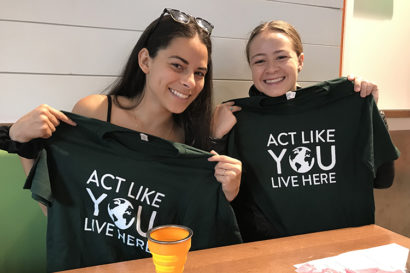Berkeley takes home five higher ed sustainability awards
From a curriculum with solutions for a sustainable future to a campaign to create an herbicide-free UC, Berkeley's work shined at the annual California Higher Education Sustainability Conference.
July 12, 2019

Campus community members accepting the awards (left to right): Danner Doud-Martin, Jessica Heiges, Teresa Yu, Andrea Luna, Dante Gonzalez, Sage Lenier, Izzy Parnell-Wolfe, Lin King (not pictured: Michelle La, Mackenzie Feldman, Kira Stoll)
In a nod toward the campus’s commitment to achieving carbon neutrality by 2025, UC Berkeley took home five best practice awards Tuesday, July 9, at the annual California Higher Education Sustainability Conference (CHESC) in Santa Barbara.
“Every initiative that was recognized with an award started with an idea to do something new that would make a real environmental improvement and expand understanding,” says Kira Stoll, director of sustainability at UC Berkeley. “These best practice programs all required engagement of many people and time, and were mostly done with just seed funding. I think each of these initiatives will continue to grow.”
Also, Berkeley’s program, The Green Initiative Fund (TGIF), was a finalist for the Green Gown Student Engagement Award, hosted by a partnership with the United Nations.
Here’s a brief overview of the work that won CHESC awards:
- A curriculum with solutions for a sustainable future

Sage Lenier (left) developed and teaches a DeCal course, “Zero Waste: Solutions for a Sustainable Future.” (Photo courtesy of Sage Lenier)
In an effort to educate people about how to address climate change, student Sage Lenier, a fourth-year conservation and resource studies major, won an award for a curriculum she wrote, “Zero Waste: Solutions for a Sustainable Future,” about the science of modern landfills, the history of “trash” and how we can all reduce personal waste, among other topics. The curriculum, which Lenier has taught for the past three semesters in a student-led DeCal course, is a resource that she says gives everyone a practical guide on how we can apply existing strategies to reduce waste. “Trash is a human invention,” she says. “There are solutions. We just have to implement them.” Lenier’s long-term goal is to have her course be a regular part of the curriculum at all University of California campuses.
- Students of color environmental conference
The Students of Color Environmental Collective hosted a free, all-day environmental justice conference in February to create and support a movement to amplify the voices of underrepresented people. “The environmental movement can often be an alienating space that fails to prioritize and (re)center dialogue and action around communities of color and other marginalized groups most impacted by environmental degradation,” wrote the collective on the group’s Facebook page.
- Campaign to create an herbicide-free UC
To inspire the University of California system to rethink its reliance on toxic herbicides in grounds management, Berkeley alumna Mackenzie Feldman launched the campaign Herbicide-Free UC, now called Herbicide-Free Campus. The campaign is already at UC Riverside, UC Davis, UCLA and UC Santa Barbara, and has led to UC President Janet Napolitano temporarily banning glyphosate on all 10 campuses. The group is now working with Napolitano to make the ban permanent and to transition away from using all toxic herbicides. Herbicide-Free Campus has expanded nationally, with the mission of eliminating toxic herbicides from every school nationwide.
- Chou Hall: the country’s greenest academic building
Connie and Kevin Chou Hall, home to Berkeley’s Haas School of Business, is the first academic building in the nation to achieve the U.S. Green Building Council’s TRUE Zero Waste Platinum Certification. “We’re breaking new ground with Chou Hall,” said Walter Hallanan, a Berkeley alumnus who managed the Chou Hall project, in a Haas Newsroom story. “The certification process included community and campus engagement and communication, operational coordination, metrics and reporting, and leadership support. It serves as our campus’ beacon for zero waste buildings moving forward.”
- “Coolest UC” in the Cool Campus Challenge
In the 2019 Cool Campus Challenge, Berkeley came in first as the “Coolest UC,” reporting the most carbon-saving points of any of the UC campuses and medical center. With more than 4,200 participants — nearly 8% of the campus — Berkeley saved a combined 2,000 metric tons of carbon dioxide. That’s the same decrease in CO2 as taking 500 cars off the road for a whole year.
Read more about the awards at Berkeley’s Office of Sustainability’s website.
